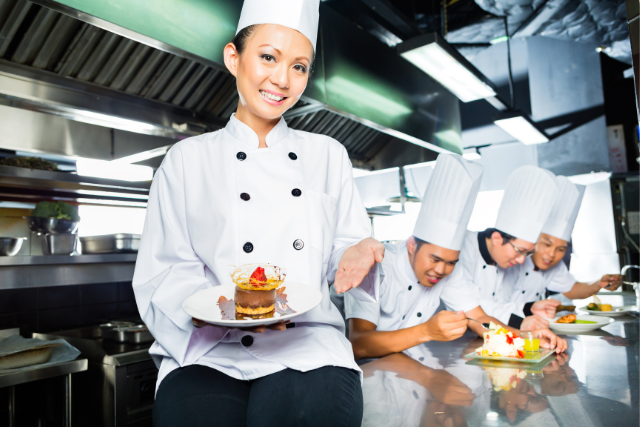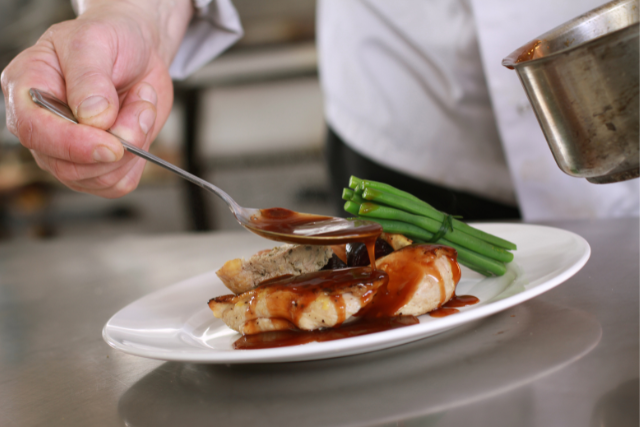
Many people think carefully before enrolling in cooking courses, especially with so many learning materials now available online. Free video tutorials and home practice provide an affordable way to build kitchen skills, leading some to question the value of formal culinary training.
But programs offered by institutions such as CCA Manila provide a more structured and professional learning experience.
So, let’s discuss this. What do cooking courses offer, and are they really worth the investment?
What You’ll Learn in a Cooking Course?

The value of a cooking course depends on what you want to get out of it. In a typical program, students build essential skills like food safety, knife handling, ingredient selection, kitchen operations, and plating. It also trains you to manage your time and work efficiently in a busy kitchen, which isn’t something you always pick up from cookbooks or online tutorials.
In the Philippines, culinary arts courses often cover international cuisines, baking and pastry arts, and menu planning. These areas give you a strong starting point for any path you take in food.
At CCA Manila, many programs, both online and in person, are designed to match different interests and support a range of career paths in the culinary field:
- Diploma in Culinary Arts & Technology Management
The Diploma in Culinary Arts & Technology Management is perfect for those wanting real-world experience through student-led dining events, catering functions, culinary tours, and industry activities. The learning opportunities help prepare learners for roles, such as line cook or chef de partie in professional kitchens. - Professional Chef Plus
This six-month course, developed by CCA Manila in partnership with Rouxbe Online Culinary School, provides a flexible, part-time format suited to many learners. It supports individuals with kitchen experience seeking formal certification and those preparing for internships or career opportunities.
You can build strong culinary foundations with online access and guided instruction while managing your existing commitments.
- Bachelor of Science in Entrepreneurial Management Major in Culinary Arts
This course is best for students who like to turn their passion for food into a business. The Bachelor of Science in Entrepreneurial Management Major in Culinary Arts combines culinary training with entrepreneurship to prepare students to run their food ventures. - Professional Cook Certification + Cooking Club
The Professional Cook Certification + Cooking Club helps strengthen cooking skills and build a solid foundation in kitchen techniques. - Introduction to Pastry Arts + Baking Club
This ten-week virtual course is ideal for those interested in baking and pastry. It covers essential methods and provides guided instruction to help participants gain confidence in the kitchen. - Food Entrepreneurship Masterclass
A ten-week program created for aspiring food business owners, the Food Entrepreneurship Masterclass focuses on practical strategies to help participants build and improve their food ventures.
Experience vs. Education: What’s More Valuable?

This question often comes up in the culinary field: Can a cooking class teach what years of kitchen experience provide? The answer is yes and no, depending on the learning type.
Hands-on experience in a working kitchen builds instinct and the ability to perform under pressure. These are developed through repetition and real-time problem-solving during daily service. Over time, working in a kitchen helps sharpen judgment that’s hard to replicate outside that environment.
Meanwhile, formal training offers a different kind of learning. It provides structure, introduces professional standards from the start, and breaks down techniques clearly and systematically. Students receive focused instruction and timely feedback, which can speed up their development and help avoid mistakes that might otherwise become long-term habits.
A cooking course offers a practical starting point for those entering the culinary industry for the first time or shifting from another field. It introduces kitchen systems and prepares learners for the expectations of a professional environment.
The Cost Factor
Let’s be honest, pursuing a culinary education requires a significant financial investment. In Manila, tuition for diploma and degree programs can reach several hundred thousand pesos. Students also need to budget for uniforms and tools used during practical training.
While the cost is substantial, a formal cooking class can offer long-term value for those planning to work in the food industry. The return on investment depends on your career path and how you apply the training in a professional setting:
- For those seeking employment in professional kitchens
Many employers prefer candidates who have completed formal training. Culinary programs help prepare students for the demands of high-volume kitchens and establish a strong foundation in practical skills and kitchen discipline. - For individuals planning to start a food-related business
A full course equips future entrepreneurs with the skills to develop menus and understand the operational side of running a food establishment. - For those focused on building specific competencies
Culinary short courses offer a practical alternative to full diploma or degree programs. These courses focus allow students to build skills quickly.
In many cases, the training and industry exposure make the investment worthwhile. Most schools like CCA Manila also offer flexible payment options, letting students focus on their education without the pressure of paying everything upfront.
Redefining What Makes It “Worth It”
When people ask if cooking courses are worth it, they often focus on cost. While tuition is a key consideration, value is not defined by price alone. The time you invest and the outcomes you gain, including an improved skill or clearer direction, shape the experience.
What makes it worth it depends on how much you are prepared to commit beyond the financial side. For many, the return comes from the practical benefits of focused training and consistent effort.
Make the Investment Count—Enroll at CCA Manila Today!
At CCA Manila, we understand that choosing a culinary path takes commitment. Our programs go beyond technical training to provide hands-on experience and a learning environment that prepares you for real work in professional kitchens and food ventures.
Build your skills and confidently take the next step. Browse our programs and enroll today!
